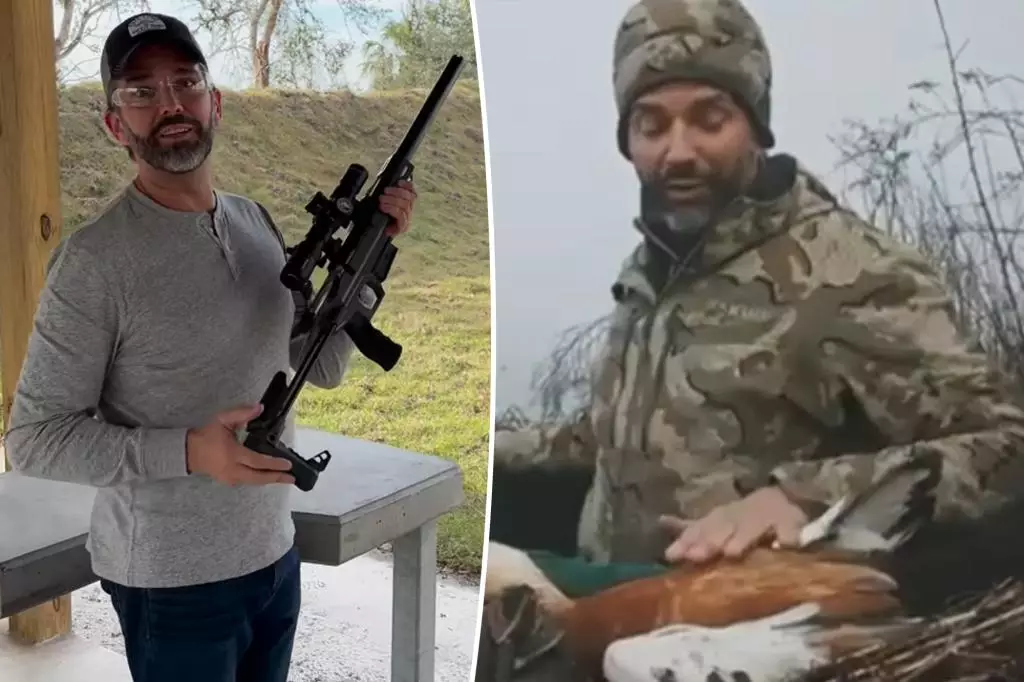In recent weeks, Donald Trump Jr. has become embroiled in a significant controversy following a hunting trip in Italy. The backlash against him, spearheaded by Italian animal activists and several politicians, focuses on the alleged shooting of a rare duck species. This incident raises vital questions about hunting laws, conservation ethics, and the responsibilities of high-profile individuals within the framework of local regulations.
The uproar started when a video surfaced of Trump Jr. hunting ducks in an area close to Venice. Activists were quick to demand accountability, claiming that local laws prohibiting foreigners from hunting were breached. They expressed disbelief that someone of Trump Jr.’s stature would disregard local customs and regulations that have long been established to protect wildlife in Italy.
As the video circulated online, solid evidence regarding the legality of Trump Jr.’s hunting activities came under scrutiny. Critics pointed to the alleged presence of a rare duck in the footage, with some sources suggesting it could be a Ruddy Shelduck—known for its distinct coloring and low population in Europe. The combination of a high-profile figure hunting an endangered species catalyzed public outrage.
Moreover, local politicians stepped into the fray, asserting that only residents of specific Italian regions possess the legal authority to hunt. Andrea Zanoni, a prominent Green Party politician, has taken a hardline stance, emphasizing that Trump Jr. allegedly violated Italian law. He mentioned that hunting licenses are strictly reserved for local residents, with comprehensive documentation required for any hunting activities. This regulatory framework is integral to wildlife conservation efforts within the country.
In response to the criticism, Trump Jr.’s spokesperson, Andy Surabian, defended the trip, stating that all necessary permits were acquired and that they hunted only in legally designated areas. Surabian claimed that the entire situation has been blown out of proportion, labeling the activists’ objections as “overcooked.” This type of pushback is not new for the Trump family, who have historically been in the limelight for various contentious matters involving hunting and conservation practices.
Critics counter these assertions by questioning the ethics behind recreational hunting, particularly when a public figure is involved. The underlying ethical debate revolves around the treatment of wildlife, the sport of hunting, and whether individuals with considerable social influence should partake in these activities, especially when they risk violating established laws. This incident echoes предыдущий controversies faced by Trump Jr., including an incident in 2019 where he faced backlash for hunting endangered sheep in Mongolia.
The legal ramifications of this incident may escalate, as local authorities have shown strong interest in pursuing action against Trump Jr. Various individuals, including MP Luana Zanella, are calling for the Minister of the Environment to investigate the allegations thoroughly. Several political figures in Italy have publicly suggested that if Trump Jr. is found guilty of infractions, he should be treated no differently than an ordinary citizen.
This situation cannot be examined in isolation, as it touches on broader issues related to hunting and wildlife conservation. It invites a more profound discourse about the responsibility inherent in hunting activities—particularly the importance of adhering to wildlife protection laws and standards globally.
At a time when many wildlife populations are facing existential threats, the behaviors of influential figures like Trump Jr. inevitably draw attention to the practices approved by elites. Whether individuals argue for hunting as a cultural practice or for conservation efforts, one undeniable fact remains: the consequences of actions taken by high-profile individuals can surface widespread discourse and activism regarding wildlife protection.
The fallout from Donald Trump Jr.’s duck hunting trip in Italy highlights crucial discussions about wildlife conservation, ethical hunting practices, and compliance with local regulations. As more facts unfold, this controversy may serve as a significant case study on the intersection of celebrity culture and environmental responsibility, potentially influencing policy and public perceptions around hunting practices in the future. It remains to be seen whether political pressure will translate into real accountability or merely fade into the background of media attention.

